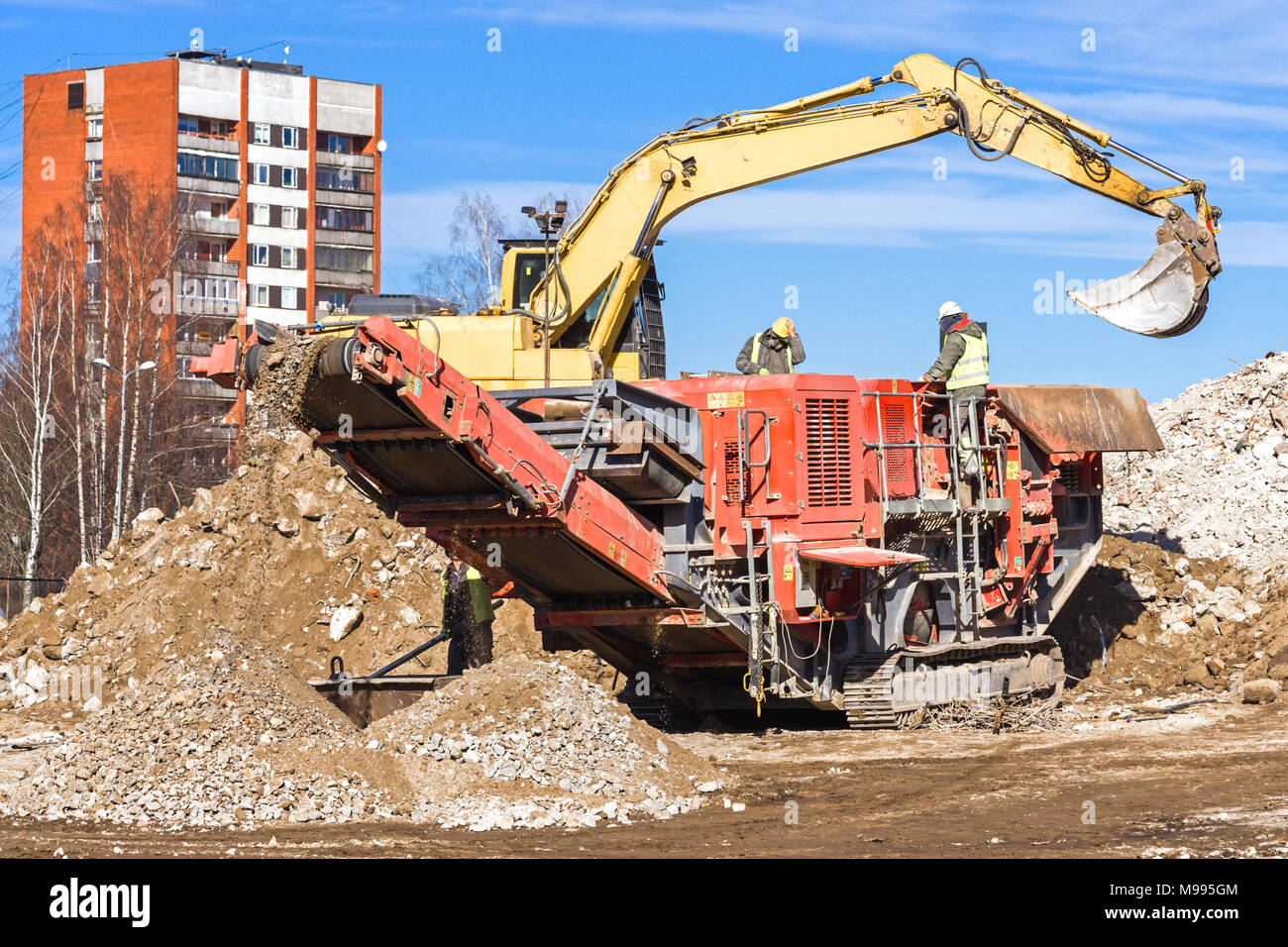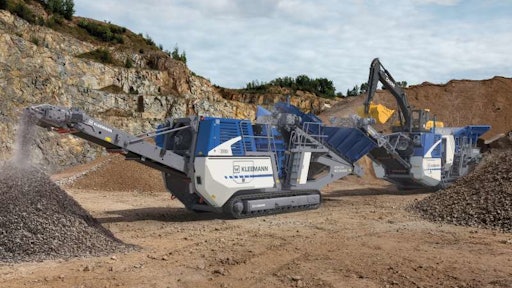Breaking Ground: Your Comprehensive Overview to Concrete Crusher for Sale
Breaking Ground: Your Comprehensive Overview to Concrete Crusher for Sale
Blog Article
Taking Full Advantage Of Sustainability: The Duty of Concrete Crushers in Recycling
Concrete waste is a widespread ecological worry, with the building market being just one of the biggest factors to worldwide carbon exhausts. Amidst this difficulty lies an appealing remedy: the role of concrete crushers in reusing. These innovative equipments have emerged as a key gamer in making best use of sustainability by changing thrown out concrete right into valuable resources. By harnessing the power of advanced modern technology, concrete crushers supply a myriad of benefits that not just minimize waste however also conserve all-natural sources and minimize the ecological effect of construction tasks. In this discussion, we will check out just how concrete crushers function, highlight the advantages of recycling concrete, showcase successful case researches, and supply a glance right into the future of this developing area. Join us as we unwind the untapped potential of concrete crushers, and uncover the course in the direction of a greener and more lasting future.
The Environmental Influence of Concrete Waste
The ecological influence of concrete waste is a significant issue in the realm of reusing and lasting construction techniques. Concrete is just one of the most extensively made use of building and construction products due to its toughness and durability. Its production and disposal add to different environmental concerns. The removal of raw products, such as limestone and clay, for concrete manufacturing results in habitat destruction and biodiversity loss. In addition, the production process itself is energy-intensive and launches a significant quantity of carbon dioxide into the ambience, adding to environment change.
The disposal of concrete waste additionally poses environmental challenges. When concrete is demolished or eliminated from building websites, it is commonly sent out to land fills, taking up beneficial area and producing greenhouse gas exhausts as it breaks down. The incorrect disposal of concrete waste can pollute soil and water sources, affecting communities and human health and wellness.
Concrete crushers play a vital duty in this process by damaging down concrete waste into smaller sized, recyclable particles. Recycling concrete waste not only saves all-natural resources however also lowers carbon discharges linked with concrete manufacturing.
Just How Concrete Crushers Work
Concrete crushers are powerful machines designed to damage down concrete waste into smaller particles for recycling purposes. These makers make use of hydraulic pressure and large jaws to apply pressure on concrete waste, squashing it into smaller sized pieces that can be recycled as accumulations in new building and construction projects.
The procedure of just how concrete crushers work starts with the feeding of the concrete waste into the crusher's receptacle. The receptacle, which is generally outfitted with a vibrating feeder, makes sure a regular and also circulation of material right into the crusher.
Once inside the crusher, the concrete waste is subjected to the squashing action of the machine's jaws. These jaws, which are usually made from solid and sturdy materials like manganese steel, exert remarkable pressure on the concrete waste, damaging it down right into smaller, more manageable items.
The crushed concrete waste then goes through a collection of displays or filters, which arrange the accumulation by size (concrete crusher for sale). This permits the splitting up of larger items that may require further squashing from smaller, ready-to-use aggregates

Benefits of Recycling Concrete With Crushers
Reusing concrete waste with the help of crushers provides various benefits in the direction of lasting building methods and resource conservation. One of the vital benefits of reusing concrete is that it assists reduce the demand for new building products.
One more considerable benefit of recycling concrete is the decrease in landfill waste. Concrete waste takes up a substantial quantity of space in land fills, and its disposal can add to contamination and greenhouse gas discharges. concrete crusher for sale. By recycling concrete, we can divert this waste from garbage dumps and reduce the strain on these already restricted resources. Furthermore, recycling concrete can help in reducing transportation expenses and carbon discharges linked with hauling waste material to landfills.
In addition, making use of recycled concrete can bring about set you back financial savings in building tasks. Crushed concrete is typically less costly than making use of brand-new materials, making it an eye-catching alternative for contractors and developers. Recycling concrete can also add to LEED (Management in Energy and Environmental Layout) accreditation, which is an extensively identified requirement for sustainable structure methods.
Study: Successful Concrete Recycling Projects
Several noteworthy instance researches exemplify the success of concrete reusing projects in different construction and framework advancements. By carrying out a concrete crusher on-site, the task was able to reuse and reuse roughly 98% of the demolished concrete, resulting in substantial price savings and lowered environmental impact.
An additional effective study is the Sydney Metro Northwest task in Australia. This major facilities advancement entailed the building and construction of a brand-new city railway. To reduce the task's carbon impact and advertise sustainability, concrete crushers were made use of to reuse the knocked down concrete from old buildings and structures. This strategy not only saved garbage dump area but also caused significant material cost savings and minimized transportation expenses.
Additionally, the Los Angeles International Flight Terminal (LAX) growth task integrated concrete recycling as a vital component of its sustainability efforts. By utilizing crushers to process and reuse the destroyed concrete, the task was able to divert countless lots of waste from garbage dumps and lower the demand for virgin aggregate. This not only reduced ecological impact but also helped the project accomplish LEED see it here accreditation.
These study show the performance of concrete crushers in taking full advantage of sustainability and advertising the round economy in building and infrastructure tasks. By embracing concrete recycling, developers can lower waste, save sources, and add to a more lasting future.
Future Advancements in Concrete Crushing Technology

One of the future developments in concrete squashing innovation is the development of robot crushers. These crushers will be geared up with sophisticated sensors and expert system abilities, enabling them to autonomously identify and divide various products in demolished concrete. This will dramatically decrease the demand for hands-on sorting, saving time and resources.
Another location of advancement is using advanced squashing techniques that can extract a greater percentage of accumulations from demolished concrete. Currently, a significant quantity of aggregates are shed throughout the squashing process. With the development of brand-new squashing innovations, it is anticipated that the recovery rate of aggregates will boost, leading to an extra efficient and sustainable recycling procedure.
In addition, scientists are checking out using different energy resources to power concrete crushers. By using renewable energy, such as solar or wind power, the carbon impact of the squashing process can be more minimized, adding to a greener and extra sustainable building and construction market.
Final Thought
To conclude, concrete crushers play a critical function in making the most of sustainability with the recycling of concrete waste. By lowering the environmental impact of concrete waste and promoting the reuse of materials, crushers add to an extra sustainable building sector. The advantages of reusing concrete with crushers are many, including conservation of sources, reduction of landfill area, and decreased carbon exhausts. With future advancements in concrete crushing innovation, the web link potential for also higher sustainability in the market is appealing.
Concrete crushers play an important role in this procedure by damaging down concrete waste into smaller sized, multiple-use bits. Recycling concrete waste not only preserves natural sources but also reduces carbon exhausts connected with concrete production.
By implementing a concrete crusher on-site, the job was able to reuse and recycle about 98% of the knocked down concrete, resulting in considerable cost financial savings and minimized environmental effect.
To lower the job's carbon footprint and promote sustainability, concrete crushers were used to recycle the destroyed concrete from old structures and structures (concrete crusher for sale).In conclusion, concrete crushers play an her response important duty in maximizing sustainability via the recycling of concrete waste
Report this page